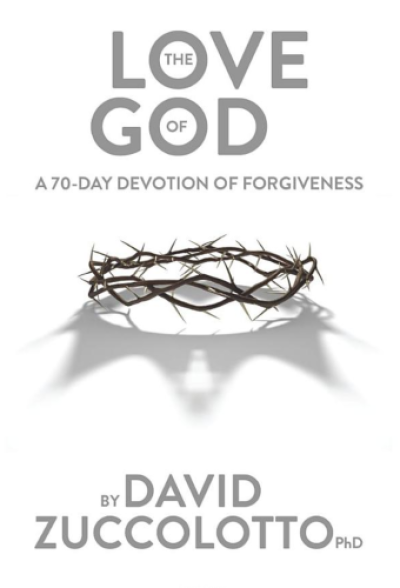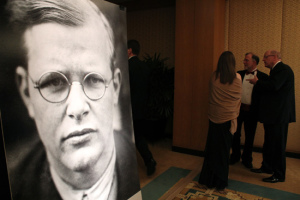Book excerpt: Christian psychologist's journey through sorrow, pain, and steadfast love
From The Love of God: A 70-Day Devotion of Forgiveness by David Zuccolotto.

DAY 11: Love and excessive sorrow
"You should forgive and comfort him, otherwise such a one might be overwhelmed by excessive sorrow" (2 Corinthians 2:7).
It was a Thursday morning when I heard my patient had jumped from a bridge and killed himself. I was working at an inpatient psychiatric hospital at the time. It was my first time to lose a patient to suicide.
Had I missed something? I drove quickly to work and reviewed my notes. I cried alone in my office. The patient was only 22. Artistic, creative, funny.
I was under enormous pressure at the time, and my spiritual battle was in full agony. My distance from God riddled me with guilt, and the death of the young man put me over the top. The sorrow was suffocating.

I had just started counseling with a pastor, and was to meet with him that night. I didn’t want to cancel (even more guilt), but needed something to calm my nerves. So I drank.
When I arrived, the pastor asked, “Zucc, Have you been drinking?
He was a Texas boy who wore cowboy boots and never pulled his punches. It’s why I agreed to meet with him.
“Yes,” I said.
The pastor leaned forward and grabbed my attention with his eyes. “If you drink again before one of our sessions, I am going to kick your butt around this office! You got me?”
I loved the man. Still do. At that time, I never would have listened to anyone else.
What the Pastor didn’t know that night is that my sorrow had reached a breaking point. It had become an excessive sorrow.
In Paul’s letter to the Corinthians, he warns of a sorrow that can be too much to bear.
A Christian had been caught in sin and confronted. Evidently, this Christian responded well to being corrected. But Paul worried that he might be overwhelmed with guilt and sorrow disproportionate to the sin. As when you discipline your child, you want their regret to change their behavior, but without crushing their spirit.
This is a beautiful picture of God’s love. God never wants our sorrow to crush us, no matter how many times we are caught in sin. He wants us to experience the lying, ugly qualities of Satan’s deception, and the sorrow it causes. But He never wants us to feel abandoned and lost.
So, how do we prevent an excessive sorrow?
Paul said, “You should forgive and comfort him.” There it is again: love one another. That is the solution.
No matter what degree of evil, suffering or sin, the solution is to forgive and love one another.
After 40 years of sharing people’s sorrows, I have experienced this power first-hand. Whether you feel crushed by the world’s evil or by your own mistakes, if one person comes to you with genuine words of forgiveness and love, your path to healing has begun. It doesn’t require psychological “tools,” theological concepts, or profound philosophy. Simply one wise soul (or cowboy pastor) who holds your hand, and who makes real for you the forgiveness and love of Jesus.
DAY 17: “God won’t give you more than you can handle.”
"No temptation has overtaken you but such as is common to man; and God is faithful, who will not allow you to be tempted beyond what you are able...." (1 Corinthians 10:13)
No subject challenges the love of God more than the problem of evil. Because of this problem, many people reject the idea of a loving God. What kind of God would let some of us prosper, and abandon others to the horrors of history?
Unfortunately, many Christians and pastors today address the problem of evil using bumper sticker theology. One of the most popular is, “God won’t give you more than you can handle.”
It’s deceptive, because it’s partly true. Ultimately, God will conquer all evil, and will bring all believers safely into heaven.
But it also implies that God won’t let Christians experience anything they can’t personally conquer — that the degree of evil or challenge you experience is in proportion to your ability. The greater the evil, the stronger you must be.
I can’t imagine telling one of my patients, “I am sorry your daughter was raped, but God thinks you are strong enough to handle it.” Or, “I am sorry your son died of a drug overdose, but God says He isn’t going to give you something you can’t handle.”
What if the parents couldn’t handle it?
I couldn’t. When my wife betrayed me, I gave up on the church. I turned to vodka instead of prayer. I spent more time in self-pity than with my kids. With every trip and fall, my anger worsened and my ability to cope decreased. I was crushed and destroyed.
Will God abandon you because you fail — because your tragedy overwhelms your ability?
1 Corinthians 10:13 is the only scripture I’ve seen cited for this bumper sticker theology. The key to that verse is “common to man.” In the original Greek language, man is the word anthropos. From it we get our English word anthropology, the study of humankind. And what Paul meant is that no one suffers anything that isn’t common to everyone. We are all in the same boat!
Temptations and trials are common to us all. All of it is crushing. All is beyond our ability. Only God has provided “the way of escape” though Jesus’ resurrection and our eternal life.
In the lion’s den, Daniel acknowledged God’s ability, not his own. If the trial proved too much, and he was eaten by lions, God would bring him home.
When Peter believed it was too dangerous to admit his discipleship with Jesus, he failed the Lord by denying him three times. At those moments, to risk his life by proclaiming his Savior was beyond Peter’s ability.
When Jesus cried out on the cross, “My God, My God, why have you forsaken me?” it was more than even He, in his humanity, could handle by himself. He needed to rely on God the Father.
Consider this:
"They [believers in Jesus] were stoned, sawn in two, tempted and were put to death with the sword. All these, having gained approval through their faith, did not receive what was promised!" (Hebrews 11:37-39)
Evil and tragedy was too much for all to handle. All had faith; none had protection. But through their faith in Jesus, they found victory in resurrection.
Without God, you can’t handle evil. You can’t dress it up or soften its blow. You can’t put a bumper sticker on it.
But that’s okay — evil isn’t ours to handle. God’s love is in the cross. Too much for us, but not for Jesus.
DAY 38: Love celebrates forgiveness
"For out of much affliction and anguish of heart I wrote to you with many tears; not so that you would be made sorrowful, but that you might know the love which I have especially for you" (2 Corinthians 2:4).
If you think Christianity is about good people and bad people, sinners and saints, you miss the story of Jesus. The victory of following Jesus is not being on the right side of the law, nor reveling in your righteousness.
There is no victory or joy in pointing out another person’s failures or calling someone a sinner. There is no redemption in witnessing a broken heart, unless the brokenness instills the love and forgiveness of God.
In Paul’s intimate letter to the Corinthians, he discloses his vulnerability — his “anguish of heart.” Paul understood a heart damaged by Satan’s deception and led away from God. The separation. The remorse. The sorrow.
Paul did not rejoice in pointing out the sins of the Corinthians. To the contrary, he shared in their agony. And in his agony, Paul hoped they would see his love.
When I was 16, my dad bought a new Mercedes-Benz. Dad was raised in a hard-working Italian family, with little money and no luxuries. Buying a new car was a significant accomplishment in his life. After owning the car for only a few days, he graciously allowed me to take it on a date. What did this 16-year-old boy do? I challenged another friend to a race, and blew up the engine in the Mercedes!
For weeks, Dad wouldn’t talk to me. Later he said, “I was afraid to talk to you, because I thought I might kill you!”
I remember a moment in those two weeks when I tried to talk to my dad. He was in his bedroom. I entered cautiously. I was immediately struck by the image of him sitting in the dark. He quietly asked me to leave. At that moment I saw the sorrow I had caused him. But even more: the sorrow I had caused us. Dad always agonized over punishing us. In that moment, I was reminded of how much my dad loved me. His anguished heart told me he loved me, just as Paul hoped the Corinthians would understand.
God does not celebrate his righteousness over our foolishness. He does not rejoice in our being wrong and his being right. Like Paul, when God points out our sin, He hopes we see his love. “That you might know the love which I have especially for you.”
Dr. David Zuccolotto is a former pastor and clinical psychologist. For 35 years he has worked for hospitals, addiction treatment centers, outpatient clinics and private practice. He is the author of The Love of God: A 70 Day Journey of Forgiveness.




























